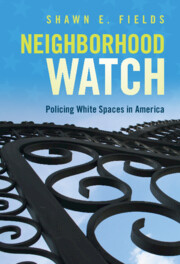Book contents
- Neighborhood Watch
- Neighborhood Watch
- Copyright page
- Dedication
- Contents
- Acknowledgments
- A Note on Language
- Introduction A Personal Protection Agency
- 1 Cycles of Racial Fear
- 2 White Caller Crime
- 3 Just a Hunch
- 4 Defending White Space
- 5 Unqualified Immunity
- 6 Permanent Fear
- 7 Rethinking Maximum Policing
- 8 Resisting a “Shoot First, Think Later” Culture
- Epilogue “Send Her Back”
- Index
7 - Rethinking Maximum Policing
Published online by Cambridge University Press: 26 May 2022
- Neighborhood Watch
- Neighborhood Watch
- Copyright page
- Dedication
- Contents
- Acknowledgments
- A Note on Language
- Introduction A Personal Protection Agency
- 1 Cycles of Racial Fear
- 2 White Caller Crime
- 3 Just a Hunch
- 4 Defending White Space
- 5 Unqualified Immunity
- 6 Permanent Fear
- 7 Rethinking Maximum Policing
- 8 Resisting a “Shoot First, Think Later” Culture
- Epilogue “Send Her Back”
- Index
Summary
Changes aimed at limiting unnecessary contacts come in many forms, including deterring racist 911 abuse in the first place and punishing it when it occurs, increasing dispatcher and police discretion to ignore frivolous 911 calls, mandating alternative, non-police responses to quasi-emergency situations for which an armed officer is not necessary or helpful, and rethinking how police respond when they are required to react. Many of these proposals derive from the same basic premise: that a fundamental reallocation of police resources is both required and desirable if society is to prevent the continued weaponization of racial fear and the continued abuse of law enforcement by private actors.
- Type
- Chapter
- Information
- Neighborhood WatchPolicing White Spaces in America, pp. 134 - 160Publisher: Cambridge University PressPrint publication year: 2022

